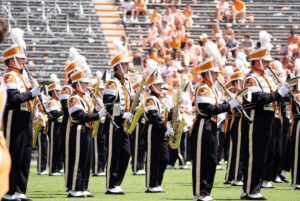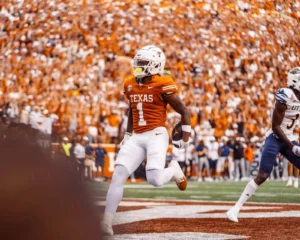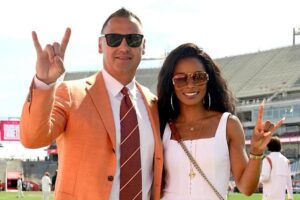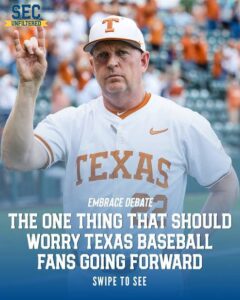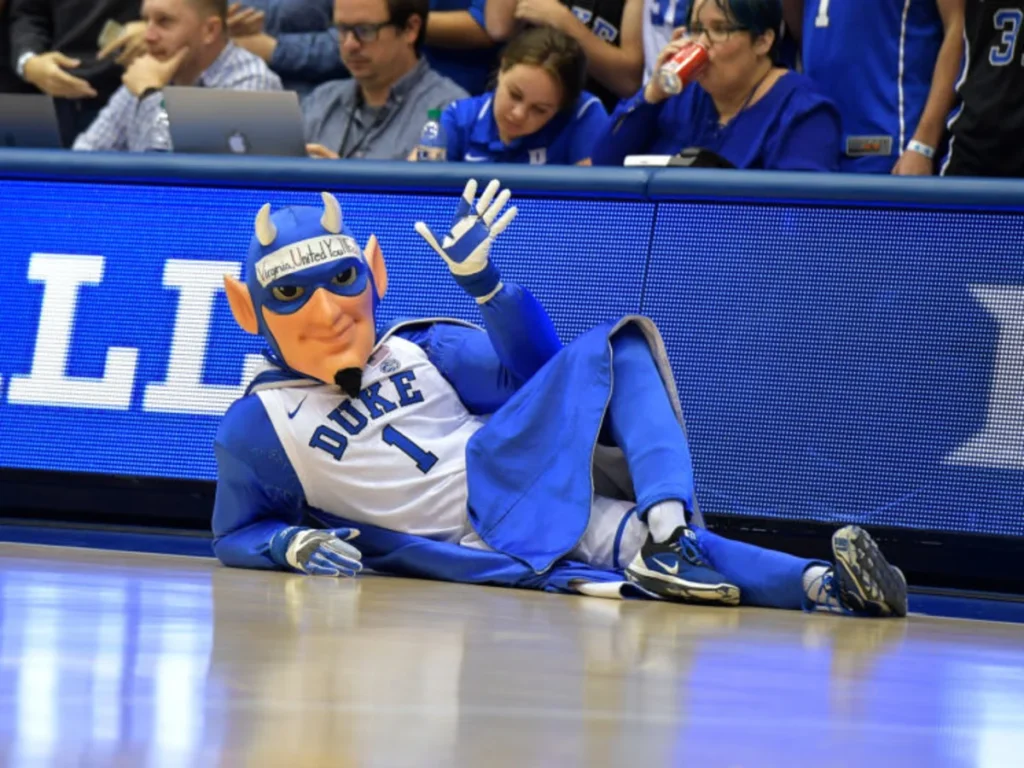
It’s a chilly evening in Durham, North Carolina. The Duke Blue Devils’ basketball team has just wrapped up another win on their home court, Cameron Indoor Stadium. The air buzzes with excitement as fans fill the streets, chanting and singing their team’s praises. Among the players is one who stands out more than most—a freshman who has already begun to live up to the immense hype that surrounded him before he ever stepped foot on the court.
Eliott Carter, a 6’7″ shooting guard from Atlanta, Georgia, had been a five-star recruit coming out of high school. He was known for his explosive athleticism, sharp shooting, and raw talent. Duke had fought off offers from some of the biggest programs in the country to secure his commitment, and after just a few games, it was clear they made the right decision. Eliott was already making an impact, starting in every game and averaging 15 points per contest, all while showing flashes of brilliance on defense.
The excitement surrounding Eliott was palpable. Fans were already dreaming of his potential in the NBA, imagining him as a future lottery pick. Coach K had spoken highly of his abilities, saying that Eliott’s maturity and understanding of the game were beyond his years. The freshman was everything Duke fans had hoped for and more, but as his first season continued, things began to shift in ways no one could have predicted.
Chapter 2: A Tough Decision
The day after a particularly dominant performance against Syracuse, Eliott woke up feeling different. It wasn’t that his body felt off or that he was physically exhausted—it was something deeper, more intangible. He had always been driven by basketball. It was his passion, his escape, and his future. But as he sat at his kitchen table in the apartment he shared with his roommate, a creeping doubt began to take hold.
Eliott had always been the type of person who lived in the moment. He was used to high expectations and the constant pressure of being the best. But now, as his freshman season was reaching its halfway point, he couldn’t shake the feeling that something was missing. The relentless grind of practices, media interviews, and the constant pressure to perform had started to take a toll on him. He had put everything into basketball, but something inside him was telling him it might not be enough.
It wasn’t just the physical exhaustion—it was the emotional weight. Being away from home, the pressure to perform every night, the loneliness of being away from family and friends, it all started to feel overwhelming. The other players on the team were his brothers, but they didn’t fully understand the depth of what he was feeling. He couldn’t articulate it to anyone—certainly not Coach K, who seemed to have endless confidence in him—but he couldn’t ignore it any longer. There was a gnawing feeling in his gut that there might be something more to life than the basketball court.
Chapter 3: The Call
It was during a rare off day that Eliott got the news that would change everything. His phone buzzed at 9:30 AM. The name on the screen was unfamiliar, but the voice on the other end sent a chill down his spine.
“Eliott,” the voice said, “This is Dr. Rachel Hayes. I’m calling from the Mayo Clinic. We have your test results, and we need to talk.”
Eliott’s heart skipped a beat. He had been feeling fine physically—other than the mental exhaustion—but he’d had some lingering issues with dizziness and headaches over the past few weeks. He’d brushed them off as part of the grind, but now, the tone in the doctor’s voice was far from reassuring.
“Is everything okay?” Eliott asked, his voice betraying his concern.
“Eliott, we’ve discovered something on your scans. It’s not serious right now, but it could affect your future in ways we can’t predict. I recommend you come in as soon as possible so we can discuss your options.”
The words seemed to blur together as Eliott felt the floor beneath him shift. It was like time slowed down, and he couldn’t make sense of what was happening. His mind raced through a thousand different scenarios. What could be wrong? What did she mean by “affect your future”?
The doctor had explained that it could be a rare condition that, with proper management, might not derail his career entirely. But the word “condition” hung in the air like a heavy weight. Eliott’s body felt cold as he set the phone down, his hands shaking.
Chapter 4: A Life-Changing Diagnosis
Two days later, Eliott was sitting across from Dr. Hayes, his parents by his side. The sterile, white walls of the Mayo Clinic did little to calm the storm brewing inside him. The doctor explained his diagnosis in clinical terms, but Eliott barely heard her words. The bottom line was that Eliott had been diagnosed with a rare neurological disorder that affected the balance centers of his brain. While it was manageable with treatment, it came with a significant risk: the disorder could flare up unpredictably, affecting his coordination and making basketball, or any sport for that matter, dangerous.
“Eliott,” Dr. Hayes said softly, “You’re in the early stages, and we can manage the symptoms with medication and therapy. But there’s no guarantee that your symptoms won’t worsen. There’s also a chance that you could experience sudden episodes of dizziness or vertigo that could put you at serious risk while playing basketball.”
Eliott stared at her, his heart heavy. This wasn’t the diagnosis he had imagined. It wasn’t just a minor injury or setback. This was something that could potentially end his dreams of playing professionally. For the first time in his life, Eliott wasn’t sure what to do.
“Are you saying… I can’t play anymore?” Eliott asked, his voice cracking. The words felt like they came from someone else, someone who wasn’t him.
“I’m not saying that,” Dr. Hayes responded carefully. “You can continue playing, but you’ll need to be monitored closely. If the symptoms worsen, you may have to make a decision about whether it’s worth the risk.”
Eliott sat back, his mind racing. He had always known that playing professional basketball came with risks. He had watched countless players fight through injuries, but this was different. This wasn’t an injury that could heal with time—it was something deeper, something that could have a lasting impact on his body and his future.
Chapter 5: The Decision
For the next week, Eliott grappled with the news. He kept his struggles from his teammates, focusing only on the game. He continued to show up at practice and to play in games, but each moment on the court felt more like a ticking clock. How long could he keep up this charade? His love for basketball hadn’t gone away, but the doubt was suffocating him. Could he keep playing knowing the risks? Could he handle the pressure of knowing that at any moment, something might go wrong?
The pressure from the media and fans only added to the intensity of the decision. Eliott’s story had been the feel-good narrative of the season—he was the freshman phenom, the future of the NBA. No one expected him to be facing a potential career-ending diagnosis.
Finally, after a particularly rough practice where his symptoms flared up, Eliott sat down with Coach K. It was time for him to have an honest conversation.
“I don’t know what to do, Coach,” Eliott said, his voice filled with frustration. “I want to play. I want to do this. But I don’t know if I can risk my future for this.”
Coach K, the legendary figure who had seen it all in his career, listened quietly. Then, with his characteristic calmness, he spoke.
“Eliott, the game will always be there. But your health—that’s the most important thing. You have a future ahead of you, and it’s not just about basketball. Whatever decision you make, we’re behind you.”
The conversation with Coach K, who had coached some of the best players in the world, was the turning point for Eliott. It wasn’t about making the right basketball decision; it was about making the right life decision.
Chapter 6: A New Path
In the days that followed, Eliott took time away from the team to focus on his health. He sought the opinions of multiple doctors and consulted with his family, who offered their unwavering support no matter the outcome. After much deliberation, Eliott made the decision to step away from basketball.
The decision was bittersweet. He knew that he was walking away from something that had been his dream for as long as he could remember, but he also knew that his health came first. Eliott began focusing on his recovery, attending therapy sessions, and learning to adjust to life without basketball as the central focus.
This is just the beginning of the story. If you want to continue, I can keep expanding on Eliott’s journey, exploring how he moves forward with his life and potentially finds a new path, whether in the game or outside of it. Would you like to keep going from here?
